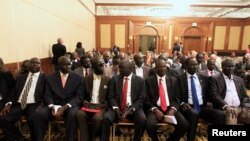South Sudan's warring factions have opened peace talks in Ethiopia, as violence continues in at least two regions of South Sudan.
The two sides begin face-to-face negotiations in Addis Ababa Sunday following days of delays.
Representatives for President Salva Kiir and ex-vice president Riek Machar are expected to discuss details for a cease-fire and rebel demands for the release of political prisoners.
However, South Sudan Information Minister Michael Makuei said at a news conference Sunday that the government will not give in to pressure to immediately release politicians detained after an alleged coup attempt last month.
"We are not ready to negotiate on preconditions. This is why we are here," he said. "The question of the releases should not be annexed to the successful peace talks. We came here to talk peace without conditions and to come and tell us that 'release these people so that they talk' is a condition and we are not ready to accept any precondition."
U.S. Secretary of State John Kerry said Sunday that Washington will support those seeking peace, but will work for international pressure against those who use force to gain any advantage. Kerry said negotiations must be serious - not a "gimmick."
South Sudan's unrest began in mid-December, when renegade soldiers attacked an army headquarters. President Kiir accused Machar of a coup attempt.
Ethiopian Foreign Ministry spokesman Dina Mufti - in an interview with VOA - says several items will be high on the agenda of the negotiations.
"Definitely cease-fire will be on the top of agenda, then the issue of opening humanitarian corridors, the issue of releasing detainees and other issues," said Dina Mufti.
Mufti says negotiators are anxious to find a resolution to the fighting, which has left more than 1,000 people dead.
"All sides are feeling the need, the urgency, for a cease-fire and everything else," said Mufti.
On Saturday, there were reports of heavy fighting near Bor, the rebel-held capital of Jonglei state. Government troops are trying to reclaim the city. And explosions and automatic artillery fire rattled a government district in the capital, Juba, on Saturday.
The talks in Ethiopia are being mediated by the East African regional bloc IGAD (Intergovernmental Authority on Development).
EU Horn of Africa representative Alexander Rondos is at the meeting. He says the responsibility to find a solution to the conflict rests in the hands of South Sudan's political leadership.
"The leadership of South Sudan, the entire political leadership needs to find a resolution, there are no alibis, only they can find that solution. And they must do everything to help the negotiators from IGAD to find that solution and very quickly."
Machar told VOA Wednesday that President Kiir is responsible for much of the unrest. He said peace cannot be achieved under the president's leadership.
Witnesses say some of the violence is ethnically motivated, with supporters of Kiir, a member of the Dinka tribe, and supporters of Machar, from the Nuer tribe, targeting each other.
The two sides begin face-to-face negotiations in Addis Ababa Sunday following days of delays.
Representatives for President Salva Kiir and ex-vice president Riek Machar are expected to discuss details for a cease-fire and rebel demands for the release of political prisoners.
However, South Sudan Information Minister Michael Makuei said at a news conference Sunday that the government will not give in to pressure to immediately release politicians detained after an alleged coup attempt last month.
"We are not ready to negotiate on preconditions. This is why we are here," he said. "The question of the releases should not be annexed to the successful peace talks. We came here to talk peace without conditions and to come and tell us that 'release these people so that they talk' is a condition and we are not ready to accept any precondition."
U.S. Secretary of State John Kerry said Sunday that Washington will support those seeking peace, but will work for international pressure against those who use force to gain any advantage. Kerry said negotiations must be serious - not a "gimmick."
South Sudan's unrest began in mid-December, when renegade soldiers attacked an army headquarters. President Kiir accused Machar of a coup attempt.
Ethiopian Foreign Ministry spokesman Dina Mufti - in an interview with VOA - says several items will be high on the agenda of the negotiations.
"Definitely cease-fire will be on the top of agenda, then the issue of opening humanitarian corridors, the issue of releasing detainees and other issues," said Dina Mufti.
Mufti says negotiators are anxious to find a resolution to the fighting, which has left more than 1,000 people dead.
"All sides are feeling the need, the urgency, for a cease-fire and everything else," said Mufti.
On Saturday, there were reports of heavy fighting near Bor, the rebel-held capital of Jonglei state. Government troops are trying to reclaim the city. And explosions and automatic artillery fire rattled a government district in the capital, Juba, on Saturday.
The talks in Ethiopia are being mediated by the East African regional bloc IGAD (Intergovernmental Authority on Development).
EU Horn of Africa representative Alexander Rondos is at the meeting. He says the responsibility to find a solution to the conflict rests in the hands of South Sudan's political leadership.
"The leadership of South Sudan, the entire political leadership needs to find a resolution, there are no alibis, only they can find that solution. And they must do everything to help the negotiators from IGAD to find that solution and very quickly."
Machar told VOA Wednesday that President Kiir is responsible for much of the unrest. He said peace cannot be achieved under the president's leadership.
Witnesses say some of the violence is ethnically motivated, with supporters of Kiir, a member of the Dinka tribe, and supporters of Machar, from the Nuer tribe, targeting each other.















